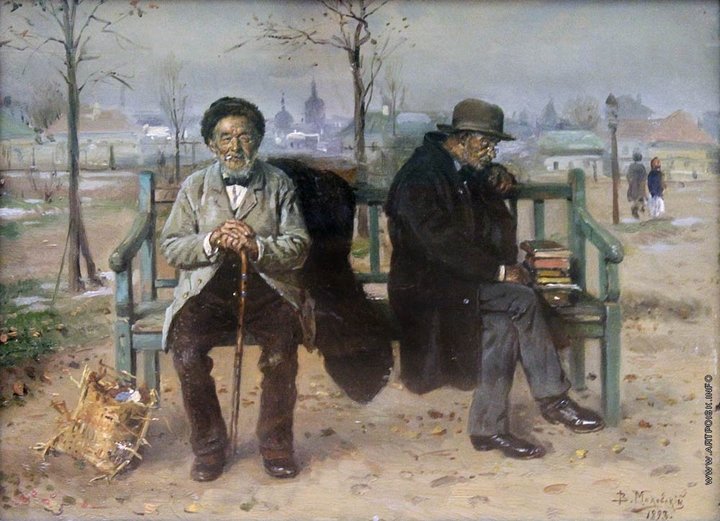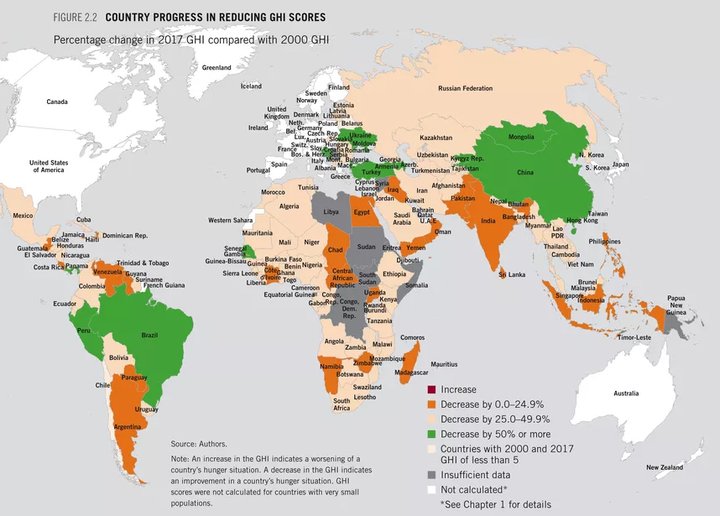We have fallen upon evil times
And the world has waxed very old and wicked.
Politics are very corrupt.
Children are no longer respectful to their parents.
—- Akkadian King Naram Sim c. 2254 – 2218 BC
###
Ah, the good old days! Things were good back then, not like now. Reading the headlines, eavesdropping on conversations in my local bar or coffee shop, simply noticing my own mood falling asleep at night—it sure feels like the state of the world sucks more than it used to. Just a few key phrases and, whatever sunny outlook I might be experiencing at the time dissolves into hopelessness: ocean acidification, species extinction, global warming, sea level rising, Alabama abortion law, Afghanistan, Syria, Iraq, The Wall, Guantánamo, fake news…

“An optimist and a pessimist” painted in 1893 by Vladimir Makovsky (1846–1920). Public domain.
Against all this, optimism seems unseemly, heartless even. But there’s optimism and optimism. In an op-ed, philosopher George Patrick announced the “new optimism” which can “…also be called dynamic, or practical, or psychological optimism. It has for its motto: ‘The world is pretty good, and we will make it better.’” Unfortunately, Patrick picked a bad time to declare for any sort of optimism: his essay was published in Popular Science Monthly in May 1913, the year before WW1 broke out.
In the same vein, Bill Gates, in a piece for Time last year, called himself a “possibilist” as in “…someone who neither hopes without reason, nor fears without reason…This is not optimistic…It is having a worldview that is constructive and useful.”
Too sunny for you? Take a look at the overall state of the world today, compared to a few decades ago.
- In the last 30 years, the number of children who die before their fifth birthday has halved.
- The number of maternal deaths decreased by 43% between 1990 and 2015.
- Since 1900, average life expectancy has more than doubled; it’s now nearly 70 years.
- The proportion of the global population living in extreme poverty is less than half what it was 20 years ago.
- In 1900, homosexuality was legal in 20 countries. Today, it’s OK to be gay in over 100. (With much progress still to be made: it’s currently a crime in 72 countries, and punishable by death in eight.)
- In the early days of passenger flight, crashes were relatively common. In 2016, of 40 million commercial passenger flights, 10 crashed.
###

Global hunger 2000-2017. Red = countries where hunger has increased; orange or tan = decreased; green = decreased by more than half. (International Food Policy Research Institute)
With all these positive trends, what’s with all the negativity? Obvious reasons include:
- We’re genetically primed to pay more attention to unpleasant things than pleasant ones. If you were barely surviving a million years ago, say, on the African savannah, you’d be wise to assume that the rustle in the grass is bad news—a sabertooth?—rather than the wind.
- The media (“enemy of the people” according to OFL) thrives on the bad stuff, mostly skips the good: “If it bleeds it leads.” Also, most of the positive trends are just that, trends, they happen too slowly to be noticed. Disasters are more immediate—and photogenic.
- Most people (I read somewhere) remember the past as better than it actually was, while downplaying negative events in their minds. (Me, I’m the opposite: say “Seattle” and what pops up is lost friendships, not the good times.)
- We’re just naturally pessimistic: Humans, incapable of being happy, spend their entire existence fantasizing they will be happy in the future. (Giacomo Sartori, I Am God)
Me, I’ll take my cue from one of Gary Larsen’s whimsical Far Side cartoons. Two cows are sitting cross-legged across from one another. One, wearing a Buddhist monk’s robe is counseling the other: “And, as you travel life’s highway, don’t forget to stop and eat the roses.”
CLICK TO MANAGE